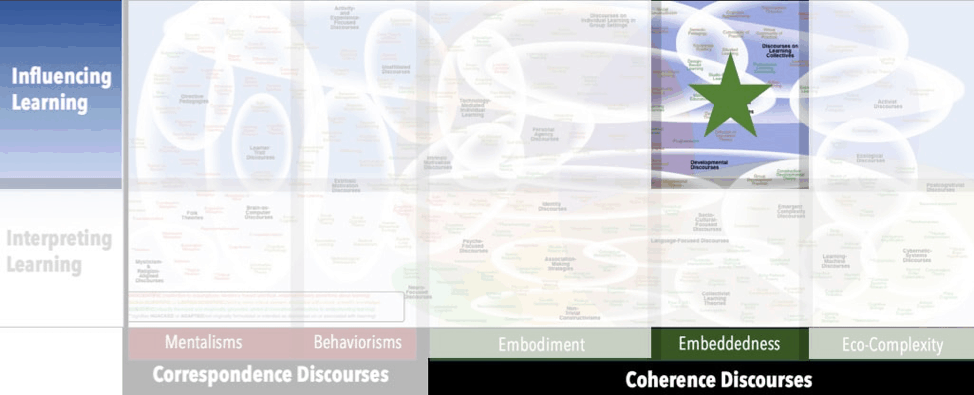Focus
Strategies to create equitable classroomsPrincipal Metaphors
- Knowledge is … established abilities
- Knowing is … competent action
- Learner is … a contributor (individual)
- Learning is … equitable participation
- Teaching is … facilitator, moderator
Originated
1970sSynopsis
Complex Instruction is a group-based teaching approach that focuses on strategies to promote equal-status interactions among learners. Working from the principle that unequal participation leads to unequal opportunities to learn while potentially reinforcing prejudices and stereotypes, Complex Instruction deliberately interrupts hierarchical, role-defining structures of other group-based approaches, such as Cooperative Learning. Academic emphases include conceptual understanding, problem solving, and language development. Social emphases include friendliness and trust. Associated discourses include:- Complex Learning (Robert Gagné, David Merrill, 1990s) – a notion offered as a counterpoint to curriculum structures and teaching approaches that are experienced as fragmented and disconnected. Aiming at a more “complex” – that is, integrated and holistic – attitude, Complex Learning emphasizes relationships among elements and across other disciplines and categories of experience.
Commentary
While it is asserted that Complex Instruction is focused on both academic growth and social development, the discourse places most of its emphasis on the latter. That is, matters such as social competency and group functioning are foregrounded, and relatively little attention is given to such matters as the structures and natures of different subject matters, the role of robust classroom resources, and the nature and importance of teacher disciplinary knowledge. This point is especially evident in the discourse’s own self-descriptions, which highlight that the approach is effective regardless of subject matter. While an important contribution, then, Complex Instruction should not be construed as a model that attends to the complexity of formal education.Authors and/or Prominent Influences
Elizabeth CohenStatus as a Theory of Learning
Complex Instruction is about promoting equitable learning, not about conceptualizing or interpreting learning.Status as a Theory of Teaching
Complex Instruction is, explicitly, a discourse on teaching.Status as a Scientific Theory
Complex Instruction has been extensively researched and is supported by a considerable body of research showing that it is associated with positive effects on social competence, personal well-being, and academic achievement – across subject areas, age/grade levels, and cultural settings. It is also well theorized and is explicitly aligned with several prominent Embeddedness Discourses.Subdiscourses:
- Complex Learning
Map Location

Please cite this article as:
Davis, B., & Francis, K. (2024). “Complex Instruction” in Discourses on Learning in Education. https://learningdiscourses.com.
⇦ Back to Map
⇦ Back to List
